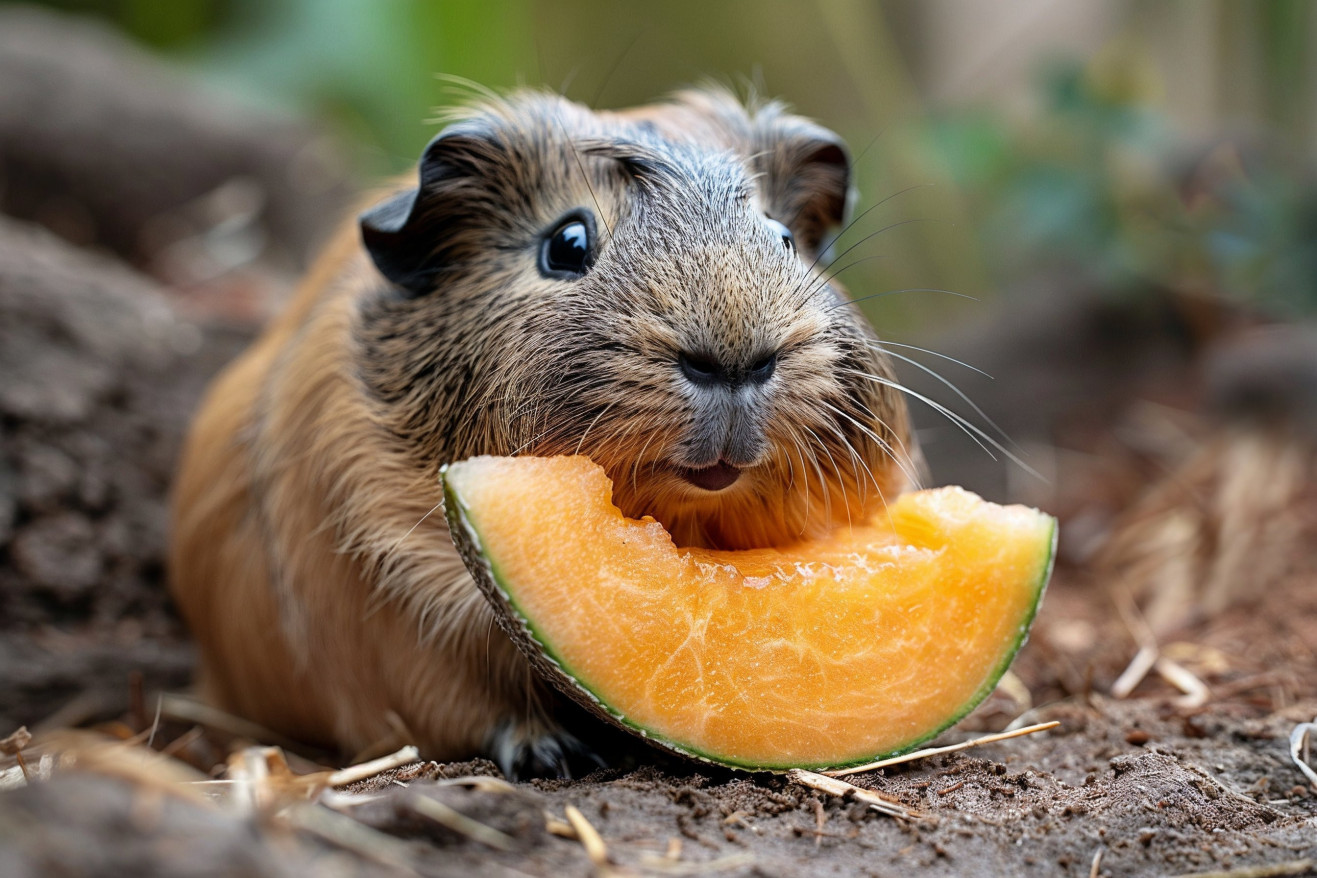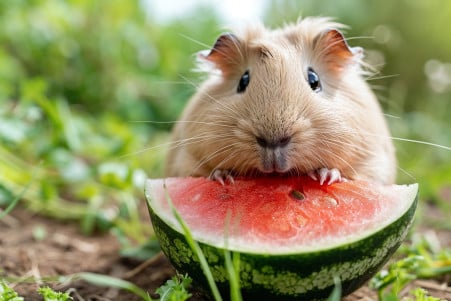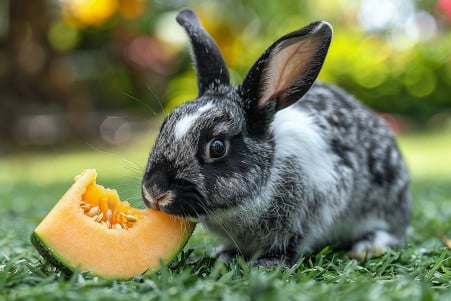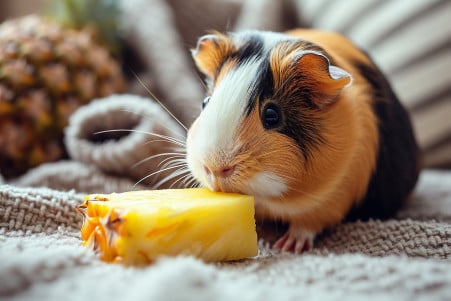Can Guinea Pigs Eat Cantaloupe? A Closer Look
31 March 2024 • Updated 30 March 2024

If you're wondering whether cantaloupe is a good option for your guinea pig, the answer is yes, but with a few caveats. Cantaloupe can be a healthy and tasty treat for guinea pigs if it's fed to them in moderation. Not only is it a good source of vitamin C, but it also contains other important nutrients such as vitamins A and B6. Plus, cantaloupe is full of water and fiber, which can help with digestion. On the other hand, cantaloupe is high in sugar, so it should be given to guinea pigs as part of a well-rounded diet that's based on hay.
In this article, we'll take a deep dive into the studies and expert advice that covers how much cantaloupe guinea pigs can eat, the risks associated with feeding them cantaloupe, and the best practices for introducing new foods to their diet. By learning more about what guinea pigs need from their food and how their digestive systems work, you'll be better equipped to decide how to add healthy treats to their diet without compromising their health.
Can guinea pigs eat cantaloupe?
Nutritional Benefits of Cantaloupe for Guinea Pigs
Cantaloupe has a number of nutritional benefits that make it a good treat for guinea pigs to enjoy in moderation. One of the most important is that it is a great source of vitamin C, which is important for guinea pigs because they can't make it themselves. In addition, cantaloupe is high in water, which can help keep guinea pigs hydrated and support healthy digestion, especially when combined with its fiber content, according to vetplayas.com.
In addition to vitamin C, cantaloupe is full of other vitamins and minerals that can benefit guinea pigs. It has vitamin A for vision and immune health, vitamin B6 for metabolism, vitamin K for blood clotting, as well as potassium and magnesium, according to the nutrient data chart from Guinea Lynx. In addition, the antioxidants and phytonutrients in cantaloupe may also have other health benefits for guinea pigs.
While cantaloupe should be fed in moderation as part of a balanced diet that is primarily made up of hay, its nutritional value means that it can be a good treat when fed correctly. Because of its water content, fiber, and vitamins and minerals, cantaloupe can be a good way to add some variety and nutrition to your guinea pig's diet in moderation. However, there are some important risks to be aware of and precautions to take, which we'll discuss next.
Potential Dangers and Things to Keep in Mind When Feeding Cantaloupe
Even though cantaloupe can be a healthy snack for guinea pigs, there are some potential dangers and things to keep in mind. The Medium article explains that cantaloupe is high in sugar and carbohydrates, which can lead to obesity and other health problems if it's fed to guinea pigs too often. The article also explains that the seeds and skin of cantaloupe need to be removed because they can cause digestive issues and choking.
Feeding guinea pigs new foods like cantaloupe too quickly can also cause problems because their digestive systems are so sensitive, as the Vet Playas Veterinary Hospital points out. To avoid this, the article suggests introducing cantaloupe to guinea pigs slowly and watching for any negative reactions. In addition, the GuineaDad Food Blog explains that non-organic cantaloupe can have pesticide residues that may be harmful to guinea pigs, so it's best to feed them organic or farmer's market cantaloupe.
Knowing these potential dangers and taking the right steps to avoid them can help you make sure that cantaloupe is a safe and healthy addition to your guinea pig's diet. That said, it's important to make sure that you don't feed them too much cantaloupe and that you watch for any negative reactions to make sure that it's not having a negative impact on their health. We'll cover the right serving size and frequency for cantaloupe in the next section.
How Much and How Often Can Guinea Pigs Have Cantaloupe?
The GuineaDad Food Blog suggests that cantaloupe should be considered a treat and not a regular part of a guinea pig's diet. They recommend feeding cantaloupe to guinea pigs one to two times per week, with a serving size of about a one-inch cube.
The Vet Playas Veterinary Hospital also says that guinea pigs can be given melon two times per week in small amounts, noting that guinea pigs may choose to eat sweet fruits instead of their regular food. They also say that any uneaten melon should be removed after 20 minutes to avoid it going bad.
It's important to introduce cantaloupe slowly and observe your guinea pig's response before increasing the portion size, as Hepper notes. This will help ensure that your guinea pig's delicate digestive system has time to adjust to the new food.
Making sure that you're feeding cantaloupe in moderation and controlling portion size is important when using it as a treat, as it can help ensure that you're not causing any health problems like obesity or digestive issues. If you're careful, cantaloupe can be a healthy and fun treat for your guinea pig to enjoy on occasion.
What to Know About a Healthy Diet for Guinea Pigs
A guinea pig's diet should be made up mostly of high-quality grass hay, which is an important source of fiber that helps keep their delicate digestive system functioning properly. The RSPCA explains that good-quality hay should be the main component of a guinea pig's diet and should be available to them at all times.
In addition to hay, Burgess Pet Care says that each guinea pig should be given a small portion of guinea pig-safe leafy greens and vegetables every day. These fresh foods can be used to supplement the hay and ensure that your pet is getting all of the vitamins and minerals they need.
GuineaDad also points out that guinea pigs need to get vitamin C from their diet since they can't produce it on their own. This can be done by giving them guinea pig pellets that have been fortified with vitamin C or by giving them a supplement.
While it's okay to give your guinea pig treats like cantaloupe, the RSPCA says that treats should only make up a small portion of their diet, about 2-5%. Making sure that your guinea pig gets a variety of foods and that their diet is well-balanced with the right amounts of hay, greens, pellets, and treats is important for keeping them healthy and happy.
How to Introduce New Foods to Your Guinea Pig
Because guinea pigs have sensitive digestive systems, it's important to introduce new foods like cantaloupe slowly and in small quantities. The RSPCA notes that sudden dietary changes can cause digestive upsets, so it's a good idea to keep an eye on your guinea pig's appetite, behavior, and droppings after you feed them a new food.
If you notice any negative changes in these areas, including a loss of appetite or changes in stool, discontinue the new food and contact your vet. The Vet Playas Veterinary Hospital also says that it's important to make sure your guinea pig has access to fresh, clean water to help with digestion and hydration when you're introducing new foods.
Guinea Pigs Australia recommends that you give your guinea pig time to get used to new foods. By taking it slow and keeping a close eye on your pet, you can make sure that you're introducing healthy treats like cantaloupe in a way that's safe and healthy for your pet.
Conclusion: Feed Cantaloupe to Guinea Pigs in Moderation and With Care
Cantaloupe can be a healthy and fun snack for guinea pigs as long as it's fed in moderation. However, it should be considered a supplement to a balanced diet that's primarily based on hay and fresh vegetables.
To avoid potential health issues, it's important to serve cantaloupe in the right portion sizes, introduce it to guinea pigs gradually, and monitor their reactions. A varied diet that includes the right balance of fiber, vitamins, and occasional treats can help guinea pigs stay healthy and happy.


